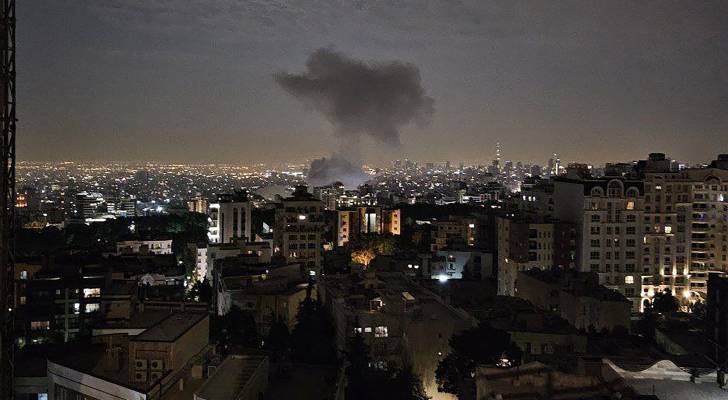Photo released by Iran's Revolutionary Guard Corps official Sepah News Telegram shows smoke billowing after an “Israeli” strike.
Roundup: 'Israel' launches massive strikes on Iran, killing top commanders, nuclear scientists
'Israel' launched a large-scale military assault on Iran early Friday, striking multiple nuclear and military facilities across the country in what its officials described as a “historic campaign” aimed at neutralizing Tehran’s nuclear ambitions and military leadership.
Explosions echoed across the Iranian capital, Tehran, with Iranian state television confirming attacks in several areas, including the northeastern Makhlati district and the uranium enrichment facility in Natanz.
'Israeli' Air Force said it had completed a “first stage” of coordinated strikes targeting dozens of strategic military sites, including those tied to Iran’s nuclear program.
Iranian state media reported that the strikes killed Major General Hossein Salami, commander-in-chief of the Islamic Revolutionary Guard Corps (IRGC), as well as Major General Mohammad Bagheri, Iran’s Armed Forces Chief of Staff. Prominent nuclear scientists Mohammad Mehdi Tehranchi and Fereydoon Abbasi were also confirmed dead.
Iran’s Supreme Leader Ayatollah Ali Khamenei responded with a warning, calling the attack a “bloody and criminal act” and vowing that “the Zionist regime must expect a severe punishment.”
“With this crime, the Zionist regime has paved the way for itself toward a bitter and painful fate, and it will undoubtedly face it,” Khamenei said in a televised statement. “The strong hand of the Islamic Republic’s armed forces will not let it go unpunished, God willing.”
'Israel' Declares Emergency, Expects Retaliation
'Israeli' Defense Minister Israel Katz confirmed the strikes and announced a nationwide state of emergency.
“Following the State of Israel’s preemptive strike against Iran, a missile and drone attack against the State of Israel and its civilian population is expected in the immediate future,” Katz said.
Air raid sirens blared across 'Israeli' cities as the military sealed off airspace and issued orders for citizens to remain in protected areas. All public gatherings and educational activities were suspended.
'Israeli' Prime Minister Benjamin Netanyahu declared that the operation would “continue for as many days as it takes,” stating that the offensive had targeted the “heart of Iran’s nuclear enrichment programme” and included a direct strike on Natanz.
“We targeted military infrastructure and eliminated high-level nuclear scientists and key military figures. This is a historic campaign unlike any other,” said 'Israeli' Army Chief Lt. Gen. Eyal Zamir, though he warned that Iran’s retaliation “may come at any minute.”
Civilian Casualties Reported
Iranian state news agency IRNA reported that 'Israeli' strikes hit residential buildings in Tehran, killing civilians including women and children. Air traffic at Tehran’s Imam Khomeini International Airport was halted, while neighboring Iraq also shut its airspace in response to escalating tensions.
Iranian military spokesperson Abolfazl Shekarchi warned that “Israel will pay a heavy price” for the attack.
“The armed forces will certainly respond to this Zionist attack,” Shekarchi said. “They should await a strong response from the Iranian armed forces.”
Global Fallout and US Reaction
The United States clarified it was not involved in the 'Israeli' strikes. Secretary of State Marco Rubio warned Iran not to retaliate against US assets in the region.
“Let me be clear: Iran should not target US interests or personnel,” Rubio said, distancing Washington from the assault.
US President Donald Trump, speaking earlier in the week, warned of a potential “massive conflict” in the region and hinted that an 'Israeli' strike could jeopardize ongoing diplomatic efforts toward a new nuclear deal.
“I don’t want them going in, because I think it would blow it,” Trump said. “Might help it actually, but it also could blow it.”
Meanwhile, oil prices surged by 12 percent and global stock markets tumbled in response to the strikes, with investors fearing a broader Middle East conflict.
Loud explosions were also reported in the city of Natanz, home to one of Iran’s main uranium enrichment facilities, shortly after Israeli Occupation confirmed its air force had struck the site. Iranian state television confirmed the blasts and suggested that significant damage was done to sensitive infrastructure.
Shortly afterward, Israeli military radio announced that a second wave of airstrikes had begun, targeting additional Iranian military infrastructure.
Iranian state media reported that several residential buildings in Tehran were hit, with the official IRNA news agency confirming that “a number of people including women and children were martyred” in a residential complex.
“Israeli” strikes on residential buildings in the Iranian capital on Thursday killed a number of civilians including children, Iranian state media said.
"A number of people including women and children were martyred in a residential complex in Tehran," the official IRNA news agency reported.
Among those killed, Iranian outlets Tasnim and Mehr reported the death of Major General Hossein Salami, commander-in-chief of the Islamic Revolutionary Guard Corps (IRGC), in an 'Israeli' strike on the IRGC headquarters. Prominent nuclear scientists Mohammad Mehdi Tehranchi and Fereydoon Abbasi were also confirmed dead, according to Iranian state television.
In response, Iran vowed to retaliate “with force.” Abolfazl Shekarchi, spokesperson for the Iranian Armed Forces, warned that “Israel will pay a heavy price” and must expect a “strong response from the Iranian armed forces.”
'Israel', anticipating retaliation, shut down its airspace Friday morning. The 'Israeli' transport ministry confirmed the closure of all takeoff and landing activity “until further notice,” and airport authorities instructed travelers not to head to Ben Gurion International Airport.




